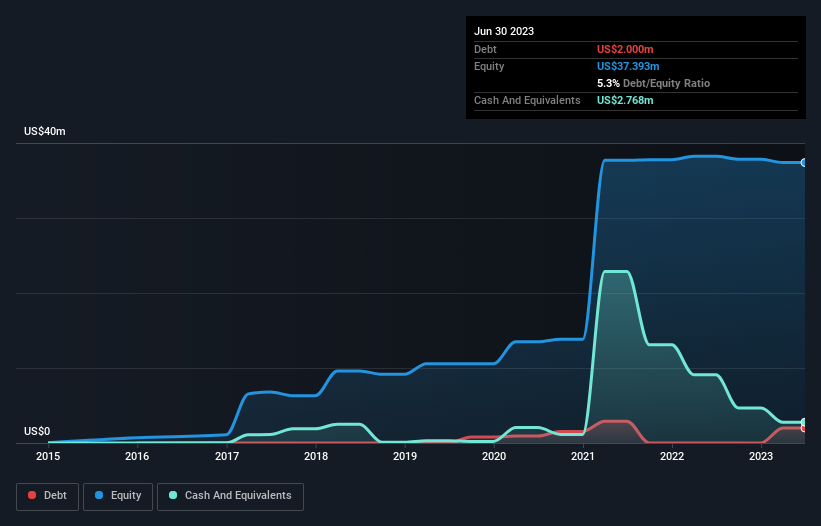Some say volatility, rather than debt, is the best way to think about risk as an investor, but Warren Buffett famously said that 'Volatility is far from synonymous with risk.' When we think about how risky a company is, we always like to look at its use of debt, since debt overload can lead to ruin. Importantly, Phoenix Copper Limited (LON:PXC) does carry debt. But should shareholders be worried about its use of debt?
What Risk Does Debt Bring?
Debt assists a business until the business has trouble paying it off, either with new capital or with free cash flow. Part and parcel of capitalism is the process of 'creative destruction' where failed businesses are mercilessly liquidated by their bankers. However, a more frequent (but still costly) occurrence is where a company must issue shares at bargain-basement prices, permanently diluting shareholders, just to shore up its balance sheet. By replacing dilution, though, debt can be an extremely good tool for businesses that need capital to invest in growth at high rates of return. The first thing to do when considering how much debt a business uses is to look at its cash and debt together.
See our latest analysis for Phoenix Copper
What Is Phoenix Copper's Debt?
You can click the graphic below for the historical numbers, but it shows that as of June 2023 Phoenix Copper had US$2.00m of debt, an increase on none, over one year. However, its balance sheet shows it holds US$2.77m in cash, so it actually has US$768.0k net cash.

How Strong Is Phoenix Copper's Balance Sheet?
We can see from the most recent balance sheet that Phoenix Copper had liabilities of US$2.28m falling due within a year, and liabilities of US$757.7k due beyond that. Offsetting this, it had US$2.77m in cash and US$194.0k in receivables that were due within 12 months. So its liabilities total US$71.1k more than the combination of its cash and short-term receivables.
Having regard to Phoenix Copper's size, it seems that its liquid assets are well balanced with its total liabilities. So it's very unlikely that the US$30.9m company is short on cash, but still worth keeping an eye on the balance sheet. Despite its noteworthy liabilities, Phoenix Copper boasts net cash, so it's fair to say it does not have a heavy debt load! The balance sheet is clearly the area to focus on when you are analysing debt. But it is future earnings, more than anything, that will determine Phoenix Copper's ability to maintain a healthy balance sheet going forward. So if you want to see what the professionals think, you might find this free report on analyst profit forecasts to be interesting.
Given its lack of meaningful operating revenue, investors are probably hoping that Phoenix Copper finds some valuable resources, before it runs out of money.
So How Risky Is Phoenix Copper?
By their very nature companies that are losing money are more risky than those with a long history of profitability. And we do note that Phoenix Copper had an earnings before interest and tax (EBIT) loss, over the last year. Indeed, in that time it burnt through US$7.4m of cash and made a loss of US$1.1m. With only US$768.0k on the balance sheet, it would appear that its going to need to raise capital again soon. Overall, we'd say the stock is a bit risky, and we're usually very cautious until we see positive free cash flow. When analysing debt levels, the balance sheet is the obvious place to start. However, not all investment risk resides within the balance sheet - far from it. For example Phoenix Copper has 4 warning signs (and 2 which are concerning) we think you should know about.
If, after all that, you're more interested in a fast growing company with a rock-solid balance sheet, then check out our list of net cash growth stocks without delay.
Mobile Infrastructure for Defense and Disaster
The next wave in robotics isn't humanoid. Its fully autonomous towers delivering 5G, ISR, and radar in under 30 minutes, anywhere.
Get the investor briefing before the next round of contracts
Sponsored On Behalf of CiTechNew: Manage All Your Stock Portfolios in One Place
We've created the ultimate portfolio companion for stock investors, and it's free.
• Connect an unlimited number of Portfolios and see your total in one currency
• Be alerted to new Warning Signs or Risks via email or mobile
• Track the Fair Value of your stocks
Have feedback on this article? Concerned about the content? Get in touch with us directly. Alternatively, email editorial-team (at) simplywallst.com.
This article by Simply Wall St is general in nature. We provide commentary based on historical data and analyst forecasts only using an unbiased methodology and our articles are not intended to be financial advice. It does not constitute a recommendation to buy or sell any stock, and does not take account of your objectives, or your financial situation. We aim to bring you long-term focused analysis driven by fundamental data. Note that our analysis may not factor in the latest price-sensitive company announcements or qualitative material. Simply Wall St has no position in any stocks mentioned.
About AIM:PXC
Phoenix Copper
Engages in the exploration and mining activities for precious and base metals primarily in North America.
Medium-low risk and slightly overvalued.
Market Insights
Weekly Picks

THE KINGDOM OF BROWN GOODS: WHY MGPI IS BEING CRUSHED BY INVENTORY & PRIMED FOR RESURRECTION


Why Vertical Aerospace (NYSE: EVTL) is Worth Possibly Over 13x its Current Price


The Quiet Giant That Became AI’s Power Grid
Recently Updated Narratives


A case for CA$31.80 (undiluted), aka 8,616% upside from CA$0.37 (an 86 bagger!).


Unicycive Therapeutics (Nasdaq: UNCY) – Preparing for a Second Shot at Bringing a New Kidney Treatment to Market (TEST)

Rocket Lab USA Will Ignite a 30% Revenue Growth Journey
Popular Narratives


MicroVision will explode future revenue by 380.37% with a vision towards success


NVDA: Expanding AI Demand Will Drive Major Data Center Investments Through 2026


Crazy Undervalued 42 Baggers Silver Play (Active & Running Mine)
Trending Discussion




